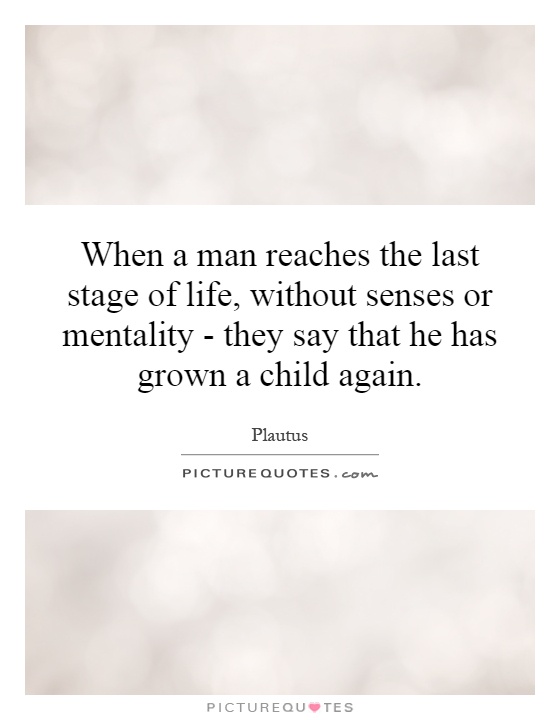When a man reaches the last stage of life, without senses or mentality - they say that he has grown a child again

When a man reaches the last stage of life, without senses or mentality - they say that he has grown a child again
In the context of Plautus, the renowned Roman playwright known for his comedic works, the idea of a man reaching the last stage of life and regressing to a childlike state without senses or mentality holds significant thematic and dramatic implications. Plautus often explored the complexities of human nature, relationships, and societal norms through his plays, using humor and wit to shed light on the human condition.The notion of a man reverting to a childlike state in old age can be seen as a commentary on the cyclical nature of life and the inevitability of aging and decline. In many of Plautus's plays, characters grapple with the passage of time and the challenges that come with growing old. By portraying a man reaching the final stage of life as akin to becoming a child again, Plautus may be suggesting that there is a certain innocence and vulnerability in old age that mirrors the innocence and vulnerability of childhood.
Furthermore, the idea of a man losing his senses and mentality in old age can also be interpreted as a reflection of the fragility of the human mind and body. In Plautus's plays, characters often find themselves in absurd and chaotic situations that test their wit, intelligence, and resilience. By depicting a man in his final stage of life as devoid of senses or mentality, Plautus may be highlighting the harsh reality of aging and the toll it takes on both the physical and mental faculties.
Additionally, the concept of a man growing a child again in old age can be seen as a metaphor for the loss of power and agency that often accompanies the aging process. In many of Plautus's plays, characters struggle to assert their authority and control over their own lives, only to be thwarted by external forces and circumstances beyond their control. By equating old age with a return to childhood, Plautus may be suggesting that in the end, we are all at the mercy of fate and must surrender ourselves to the inevitable passage of time.
Overall, the idea of a man reaching the last stage of life without senses or mentality and growing a child again in the context of Plautus's works serves as a poignant reminder of the transient nature of human existence and the universal experience of aging and decline. Through his clever and insightful portrayals of human folly and frailty, Plautus invites his audience to reflect on the complexities of life and the inevitability of mortality.












 Friendship Quotes
Friendship Quotes Love Quotes
Love Quotes Life Quotes
Life Quotes Funny Quotes
Funny Quotes Motivational Quotes
Motivational Quotes Inspirational Quotes
Inspirational Quotes